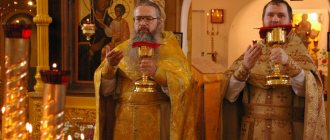Archpriest Vladimir Puchkov answers.
The world, as we know, lives according to the laws of the market. In particular, demand creates supply. For example, when the first users of mobile phones developed the habit of putting emoticons at the end of phrases in the form of open or closed brackets, manufacturers of the corresponding technology immediately took the plunge and began to include all sorts of different fancy faces in the menu, so that it would be easier for emoticon lovers to convey various emotions and shades of mood with a simple press. finger As a result, the user liked it so much that there are now so many emoticons in the menu of individual smartphones that there is no talk of any simplification of the communication process.
If life in the Church were built according to market principles, then, probably, the top ten most popular proposals would undoubtedly include a wedding without registering a marriage.
I serve in a large city parish and I regularly hear requests for weddings without registration at the registry office once every week or two. Due to the fact that the laws of the market do not fit into the logic of church life, such requests are usually answered with a refusal, which, in turn, causes no less regular bewilderment: “why not”? “Rava’s wedding isn’t more important”? “What if I don’t want to sign?” “What does state registration have to do with the Church?” “Can’t we be husband and wife before God without a marriage certificate?”
And yet, why not? And is it possible to get married without registering a marriage in any special cases?
Church marriage
In Russia, according to Rosstat, a terrifying number of divorces (58%) was recorded for 2022. Thus, in the Magadan region, out of 100 registered marriages, 86 break up, and in the Leningrad region, 80. Even the Sacrament of Wedding in modern realities is not the key to a long and happy family life. The wedding turns into a beautiful ceremony, a ritual incomprehensible to the participants. Vows made before God are not taken seriously. This means that unchurched people consider it possible to get married without an official marriage. Therefore, to the question “is it possible to get married without registering with the registry office?” The priests answer unequivocally in the negative. Except in exceptional cases.
Sacrament of Wedding in an Orthodox Church
Wedding is a special Sacrament of Marriage. The Church blesses the union of a man and a woman in the likeness of the union of Jesus Christ and the Church. The Apostle Paul writes in his letters:
“The husband is the head of the wife, just as Christ is the head of the Church, and He is the Savior of the body... Husbands, love your wives, just as Christ loved the Church and gave Himself for her” (Eph 5:25).
Metropolitan Anthony (Sourozh):
“The Sacrament of Marriage, celebrated in the community of Christians, is not a religious form of “registration,” but a deep, instructive way in which the Church wants to reveal to us what love is and how deep human relationships are.”
How and where to get married in a church without registering a marriage
You can get married without registering a marriage at the registry office in Russia in any religious building owned by the Russian Orthodox Church. In this case, it is necessary to convince the clergyman that the desire to enter into a church marriage is sincere and explain why the couple refuses to officially register the union.
The price of the ceremony is about 2000 rubles, not taking into account the cost of paraphernalia (candles, etc.). If you want to perform the ceremony abroad, you must have a certificate from the registry office with you.
For example, in the Old City in Jerusalem or in the Temple of St. Paraskeva on the embankment in Hersonissos in Greece.
Is it possible to get married without registering with the registry office?
In pre-revolutionary Russia, marriage was concluded and recorded only in the Church. State registration of marriage appeared in 1917 with the establishment of a secular state, separated from the Church. Before the revolution of the Church, not only the sacrament of Marriage took place. The priest had to ensure that the couple entering into marriage were not related. It was also necessary to establish whether they were adulterers while married. Now these functions lie with the state. And this is one of the reasons why you can’t get married without painting.
Archpriest Andrei Tkachev said:
“A couple comes to one priest and says: “We’ve been coming to your church for six months now. We don’t trust the state, we don’t love it. We are spiritual! And we want to get married. Can you get us married, but without all these stamps in the passport?..” You can soften the priest, influence him in some other way: “Is it possible?..” - “Well, you can, you can...” He got married.
And a month later, a woman comes to this priest, shows her passport and the man whom he recently married, and says: “On what basis did you marry my husband to some woman?” It turned out that this “very spiritual” man sang songs to the priest and got married to his mistress, although he himself was married and not divorced from his legal wife, with whom he lived for 15–20 years. I don't believe in "super-spirituality" - especially the modern deceitful person. Sign and then get married.”
Registration with the registry office also legally records the seriousness of the intentions of people getting married. It secures for the husband and wife their rights and responsibilities in the event of divorce. A wedding in our time has no legal force.
The exception that proves the rule
But with the second category everything is somewhat more complicated. I won’t say that every priest, but many priests, have encountered cases where the state registration of a marriage is hampered by completely objective factors. Most often this happens in second marriages between middle-aged people with adult children. Issues of inheritance, financial obligations, legal incidents, loans, different citizenships... This list can be very impressive, but the main thing here is that the couple is not at all opposed to registering a marriage, often people want this and would formalize the relationship as soon as the opportunity arises, but certain circumstances prevent this. It seems that in such a case one could say that, as an exception, a wedding without marriage is possible. Of course, provided that a particular priest has known a couple for a certain time, these people (or one of them) are his permanent parishioners and both their mutual feelings and understanding of mutual responsibility are sincere and strong. Of course, a priest should not make such decisions on his own, and it would be logical to turn to the ruling bishop for a solution to the problem. Moreover, as I have already said, the overwhelming majority of such cases occur among couples who are remarried, and the blessing of a second marriage is exclusively within the competence of the bishop.
Yes, this is definitely an exception. However, oddly enough, it confirms the rule, since in this case we are not talking about a reluctance to sign, but quite the opposite, about a desire that is hampered, to one degree or another, by objective factors. That is, not a desire to evade responsibility and not a fundamental disregard for it, but a complete readiness to take it upon oneself, which can only be realized in a wedding.
Does the Church recognize state marriage?
It is necessary to immediately separate such concepts as “civil marriage” and “prodigal cohabitation”. Cohabitation without registration in the registry office is mistakenly considered to be a civil marriage. This is fundamentally wrong. Civil marriage, also known as state marriage, is a normal marital union between a man and a woman. It is registered by the state in the registry office. Such a marriage is recognized by the Church as legal. Prodigal cohabitation is a sin, is considered unacceptable and is not recognized by the Church.
The Church also does not recognize a registered union of people of the same sex concluded in other countries. Unmarried marriage is not considered fornication
“Insisting on the need for church marriage, remind pastors that the Orthodox Church respects civil marriage” (journal of the meeting of the Holy Synod of December 28-29, 1998).
The meaning of wedding
The wedding ceremony marks the union of two human souls. According to Christian views, after a wedding, a man and woman become a “small church.” Their future life together is sanctified by grace and blessed for the birth and upbringing of children.
A wedding, with rare exceptions, is possible only once in a lifetime , so the choice of future spouses should be a conscious act of voluntary love. The ceremony is preceded by long preparation, which includes attending pre-marital courses, fasting, reading prayers, participating in the sacrament of confession and the Eucharist.
Modern features of weddings
– To perform the Sacrament of Marriage, you must have a marriage certificate. The certificate confirms the legality of the marriage. So the answer to the question whether it is possible to get married without registering with the registry office is negative.
– People who remarry are also allowed to get married. However, in the case of third marriages, the wedding is not celebrated (according to the Fundamentals of the Social Concept of the Russian Orthodox Church).
– There is no such thing as “debunking.” If married couples divorce, the church marriage is not dissolved. It is impossible to cancel a perfect Sacrament. But when you remarry, in some cases you can receive a wedding blessing. For example, if one of the spouses died. If the marriage was dissolved through no fault of the person wishing to remarry. Also in the event that the second spouse is declared mentally ill or is subject to long-term imprisonment.
– Marriage between Christians of different confessions is possible if one of the spouses belongs to the Old Believers, Catholics, Protestants or members of the Ancient Eastern Churches. But at the same time, a mandatory condition must be met: children born in marriage must be raised in Orthodoxy. True, no one can guarantee the fulfillment of the above conditions. So such a marriage requires permission from the local ruling bishop.
An exception
Despite such a tough position in the Russian Orthodox Church, there are still several exceptions to the general rule. A couple can get married without an official marriage certificate in the following cases:
- If one of the newlyweds is terminally ill, which makes it impossible to register the marriage.
- If the difference between the sacrament and the wedding ceremony is only a few hours. In this case, permission is issued upon presentation of an invitation to the ceremony to the priest.
- If one of the future spouses undergoes a complex operation with a high risk to life.
- When one of the couple is sent to hostilities, the diocese issues a wedding permit without officially registering the marriage.
- If the guy and girl are sincere parishioners, obedient to the church and observing all its canons. In this case, all responsibility will lie with the priest who married the spouses.
A vital necessity
It is worth saying that there is no vital necessity in a wedding. One comes to such a decision only when one is deeply imbued with the commandments of Christ and church life. In other words, both future spouses must be spiritually prepared to swear loyalty to each other before God and keep their promise for the rest of their lives. Few are ready for this.
You should also know that the wedding ceremony in modern Russia and the countries of the former USSR has no legal force. This means that married spouses are not married spouses in the eyes of the state and do not have corresponding rights under the law. Such people will not have property, inheritance or other rights enjoyed by spouses who have undergone a civil marriage ceremony in the registry office.
Communion in church
The meaning of church communion is to unite with Christ spiritually, physically and emotionally. This is done through eating bread, which symbolizes the Body of the Savior, and wine, which is a symbol of His blood shed for the sins of mankind.
READ
Engagement - a beautiful tradition or a necessity?
This sacrament gives the believer the opportunity to be in unity with God, to feel him and serve faithfully, while maintaining spiritual purity. The meaning is simple - any food after a meal is converted by the human body into microelements, and they, in turn, become building material for organs and tissues. Communion is actually a physical connection with the Divine source and a necessity for every believer.
As for communion before the wedding, there are rules:
- Before the Eucharist (communion), you need to confess and fast.
- The duration of food restrictions is at least 3 days.
- While fasting, you should give up not only certain foods, but also intimacy, entertainment, alcohol, smoking, TV and social networks.
- They fast before confession and only then are they allowed to take communion.
- The sacrament of the Eucharist itself is quite acceptable to celebrate before the wedding. In this case, you should not eat any food before the sacrament.
It is also worth saying that communion is one of the conditions that must be met in order to obtain permission for the ceremony.
How to prepare for a wedding
Family life must begin with spiritual preparation. Before marriage, the bride and groom bring repentance to God for their sins, confess and receive communion. Confession and Communion are the fundamental components on which family happiness and well-being will be built.
“When approaching such an important Sacrament as marriage, one must prepare oneself by cleansing oneself by confession and communion of the Holy Mysteries, and prayer, but not by balls, music and dancing, for this step extends not only to this life, but even to eternity ”(Reverend Macarius of Optina).
What is needed to perform the ritual
When entering into a church marriage, it is taken into account that the process consists of 2 successive stages. Preparations for the wedding begin in advance. The choice of time for the wedding depends on the planned registration of the marriage and the desire of the newlyweds to combine both procedures or separate them by a time interval. Suitable periods:
- first Sunday after Easter;
- after Epiphany, before the beginning of Maslenitsa;
- days between fasts: Petrov, Uspensky.
Rituals are not carried out on days of great or one-day fasting, and weddings are not performed on Thursdays, Tuesdays, or Saturdays.
Engagement
This stage precedes the wedding. Modern clergy conduct it together with the main ritual, but the ideal option is to carry out the betrothal after the engagement, with the following steps:
- confession of both future spouses;
- long conversations about the future, family purpose, planning for children.
When getting engaged, the young man talks not only with the clergyman, but also with the bride’s parents. These rules apply when the bride and groom are young and inexperienced.
Wedding
The wedding process is preceded by three days of fasting, confession and communion. The choice of date also depends on church holidays. Priests advise choosing a date carefully if there is no need to get married faster. The witnesses who are necessary for the ceremony can be either unmarried or an officially registered couple.
For the wedding you will need additional items and documents:
- marriage registration certificate, passport;
- church paraffin candles;
- towel;
- wedding rings;
- icons of Mary the Mother of God, Christ the Savior.
The ceremony begins with the bride and groom following the priest into the central part of the church. At the same time, the priest carries a censer, the newlyweds hold candles in their hands, thereby symbolizing the march towards the light. Then both stand on the spread towel and confirm to the clergyman their voluntary consent to the sacrament. Pre-declared witnesses hold crowns over the couple's heads. Next, the priest allows each of them to touch the face of the saint with their lips.
After this, the priest reads a prayer 3 times and blesses the couple 3 times. After reading the message of the Apostle Paul, those present read the “Our Father.” The next stage is drinking Cahors from a sacred cup, this is a sign of blessing the family. The couple is led around the lectern 3 times, they follow the priest with the censer, humbly bowing their heads. Illuminated icons of the Mother of God and Christ are given to the spouses to keep at home. After the ceremony, the spouses receive a wedding certificate. It is stored next to the candles.
Information! Traditional Russian custom involves storing church candles. After the death of the last spouse, both candles are placed in the coffin with the body.
Wedding without marriage registration: exceptions
A wedding in a church without registration with the registry office is still possible in exceptional cases. If young believers want to get married, but due to objective insurmountable circumstances they cannot register their union in the registry office, a wedding is possible.
“Several times in my life I agreed to get married without state registration. And this was always due to the impossibility of registering it for one reason or another. So whether it is possible to get married without registering with the registry office must be decided according to the circumstances. One striking example comes from the 1990s. The man, being a citizen of Kazakhstan, spent four years restoring his passport, but he never succeeded. And of course, I married him. There was a real wedding with a bunch of family and friends, cars and restaurants. And my conscience doesn’t blame me one bit.
For example, several times I had to deal with the fact that quite elderly people with children did not want to register their marriage so as not to “strain” their children with problems related to inheritance. And recently we had a secret service employee get married. He did not register his marriage so as not to endanger his family” (Archpriest Maxim Pervozvansky).
Are exceptions possible?
There is no canonical ban on holding a wedding ceremony without an official marriage. However, the mere desire of future spouses is not enough. Since not only the young, but also the clergy bear responsibility, each such case is considered individually by the bishop of the corresponding diocese. Only the diocesan bishop gives permission to get married bypassing the rules.
Three common reasons for exceptions:
- State registration and the wedding ceremony are scheduled for the same date, several hours apart. If you show the priest an invitation card to the registry office for a certain date indicating the names, he will probably give in and allow the wedding to be held first, and then the painting ceremony at the registry office;
- The presence of extenuating circumstances , for example, during an upcoming operation with a risk to life or before the spouse travels to a “hot spot”, the local diocesan administration will most likely give the go-ahead for the wedding without a state marriage;
- A couple who wants to get married without a stamp in their passport have been obedient parishioners of the church for many years , and the rector of the temple sees their sincere attitude towards each other, he can make an exception. In this case, he takes full responsibility for their union.
Interesting! In Russia, the star couple Anton Makarsky and Victoria Morozova are known, who were married without a wedding ceremony precisely because of the last reason on the list.
Who to pray for happiness in the family
Most often, newlyweds turn for prayerful help to saints, whose family relationships set an example of righteous life, wisdom and Christian love between spouses. The patron saints of the family are the holy faithful Prince Peter and Princess Fevronia. Their love was able to survive difficult life trials. Those close to him tried to separate Peter and Fevronia, believing that a princely wife could not come from the common people. But Prince Peter did not leave his wife and was ready to give up power and wealth for her sake.
They pray for family well-being and to the royal passion-bearers Tsar Nicholas and Tsarina Alexandra - a true example of pure, sacrificial love between spouses. They supported each other and encouraged each other in the most difficult times. Their letters are a real treasure trove for newlyweds. Here you can learn a lot of practical advice and avoid mistakes on the path to family happiness.
Read us conveniently on social networks:
Tags: wedding without marriage registration, wedding in a church without registration in the registry office, is it possible to get married without registration, is it possible to get married without registering in the registry office
Who can't get married?
The Russian Orthodox Church does not accept weddings for the following reasons:
- when the bride and groom are not baptized according to the rules of the Orthodox Church. If young people belong to opposite Christian denominations (Catholicism, Orthodoxy or Protestantism), one of them will be forced to make a choice in favor of the Russian Orthodox Church. Representatives of different directions cannot get married;
- the presence of a blood relationship between the bride and groom, up to the fourth generation. Weddings between godfathers who took part in the baptism ceremony of the same child are prohibited. It is also not permitted to enter into a church marriage between godparents and children;
- if the man or woman has a previous undissolved marriage. The lack of freedom from old family ties imposes a ban on the wedding of someone who is married to another person, regardless of the “authority” for consolidating the relationship (in the registry office or church). In this situation, it is necessary to obtain either a divorce certificate or official permission from the bishop - a blessing for a new marriage.
It is not allowed to conduct a wedding ceremony during the four Great Lents, on Easter week. It is also prohibited to get married more than three times.
Preparation: practical points
– There is an opinion that a wedding is such a personal matter that takes place between two people and God that only the wedding couple and the priest should be present at it...
– I believe that there is nothing wrong with the absence of witnesses at the wedding. In England or Greece, this Sacrament is also one of the forms of legalization of marriage - there religious denominations are given the right to issue state marriage certificates. We don’t have this in our country: the sacrament takes place within the church community and does not require witnesses to what people promised each other - this is their business before God.
But this is precisely why there is a strict requirement: we marry people only after they have entered into a legal marriage and are officially registered. Except in extreme cases, when this issue is difficult for some objective reasons, and not because people do not want to sign, but want to live for their own pleasure and at the same time have some spiritual preferences.
– If relatives have an indifferent or negative attitude towards the Church, what is the best thing to do: call them to join them in the Sacrament, or not?
– This is one of those questions that allows both answers. There are advantages to both options. Indeed, people often want this Sacrament to be performed on them without witnesses - this is a personal, intimate agreement between them and God. The spouses themselves must decide what to do, based on what will be more convenient for them and what seems more expedient to them.
– What is the role of parents during a wedding?
– In both the Roman, Greek, and Jewish traditions, the most important element of a marriage was the moment when the bride’s father joins the hands of the newlyweds - and passes her hand to the groom’s hand. That is, parents transfer their child into the hands of his “other half.” This moment is in the ancient rites of weddings, it was preserved in Catholicism, but in our country, unfortunately, it was lost. However, its echo remained: when the priest, before the start of the betrothal ceremony, joins the hands of the newlyweds, covering them with the stole, and, holding hands, leads the bride and groom from the vestibule to the temple, and also when, already during the Sacrament, they all together go around the lectern three times in the center of the temple . Otherwise, during the Sacrament, parents are only witnesses and co-prayers for their children.
– How should spouses themselves prepare for a wedding?
– For church people, preparation for a wedding is no different from ordinary preparation for participation in the sacraments. Except that they should think carefully about whether they are ready to shoulder their spouse with all his infirmities, passions, and problems. Clearly understanding that you should not expect that your “half” in marriage will become much better than you know her now. And this is a certain boldness that a person dares to take before God Himself! A person must clearly understand what he is taking upon himself.
If he is ready to take on another, and in the worst case scenario that he knows about, then we can hope that this marriage will take place. And if he expects that all his spouse’s shortcomings will disappear somewhere, and everything that inspires and pleases him will be revealed even more... then, most likely, everything will be exactly the opposite.
- Tough. So we have to be realistic? And timidly hope that you both will become better?
– It’s timid to hope, yes, but you can’t count on it. Why in the minds of a Christian are marriage and monasticism practically identical things? In both cases, a person sacrifices himself to another. And there are no guarantees that this sacrifice will be accepted, understood, appreciated. All happy marriages went through a very difficult, difficult, painful path of “grinding” both spouses, grinding them together. And this is always associated with the maximum belittlement of one’s own interests, oneself, one’s wishes, one’s ideas about what should happen in marriage. This is a process of “growing into” each other.
Moreover, this is the “ingrowth” of organisms that are very different at all levels. Gilbert Chesterton owns a saying that has become an aphorism: by male standards, any woman is crazy, by female standards, any man is a monster; a man and a woman are psychologically incompatible. And that's great! Because in this way they become an object of Christian activity for each other, borrow from each other the qualities they lack and share the best that is in themselves. The Apostle Paul wrote: Now your abundance is to make up for their lack; and then their abundance to supply your lack (2 Cor. 8:14). And in such constant mutual giving and interpenetration, the integral organism of the Christian family is built, which really has the right to continue even after it disappears, falls away, everything connected with physiology becomes unnecessary. We know that in the Kingdom of Heaven there is no marriage as a union of the sexes, but unity remains... Finding themselves behind the tomb without a body, the spouses still maintain their unity! But we still need to grow to this point. Do many people grow up? That's the question.
Is it necessary to take communion before the wedding?
This is not strictly obligatory, but it is natural for a believer to confess and commune with Christ before the most important events in his life. And in the Ancient Church, communion was one of the important parts of the wedding. Some words preserved in the ancient wedding rites (for example, the exclamation: “The Holy One, presanctified to the saints”), indicate that in the early Church, after communion of all members of the church community, the Holy Gifts were left to be given to the newlyweds during their wedding.
What is the “Wedding Liturgy”?
This is a Liturgy, usually performed by a bishop, in the rite of which the wedding rite is included. It is performed, for example, in Balkan and Greek churches. Now wedding Liturgies are appearing in Russia. However, this is rather an innovation: there is no evidence that this had historical precedents before.
If people have different spiritual fathers, how can they choose the priest who will marry them?
A cathedral wedding is possible, when the Sacrament is performed by several priests at once. And this is a common practice. Among the clergy it is almost impossible to do otherwise.
How much does it cost to participate in the Sacrament?
No Sacrament can be assessed, and a wedding cannot have any price. However, after performing the services (that is, worship services at the request of the laity), it is customary to donate to the temple, according to the person’s strength and conscience. At the same time, you need to understand that a wedding is the most “resource-intensive” Sacrament: here, as a rule, you need at least a quartet of singers, or even a whole choir, who, of course, need to be paid for their work. It is best to ask church officials how donations are made. Some parishes may tell you their approximate amount, but payment of a certain amount can in no case be a necessary condition for the performance of the Sacrament.
magazine "Foma"
How is a church marriage different from an ordinary one?
A beautiful tradition. “Appendix” to the wedding. Guarantee of the strength of family ties. These are the most common ideas about the Sacrament of Marriage. Meanwhile, there are both young and mature married couples who live the church life, but sometimes put off the celebration of this Sacrament for many years. What is really behind a wedding? How acceptable is it for a believer to live in an unwed marriage? How to prepare if you decide to take this step? We are talking about this with the editor-in-chief of the Bogoslov.ru portal, candidate of theology, rector of the Pyatnitsky metochion of the Trinity-Sergius Lavra, Archpriest Pavel Velikanov.











